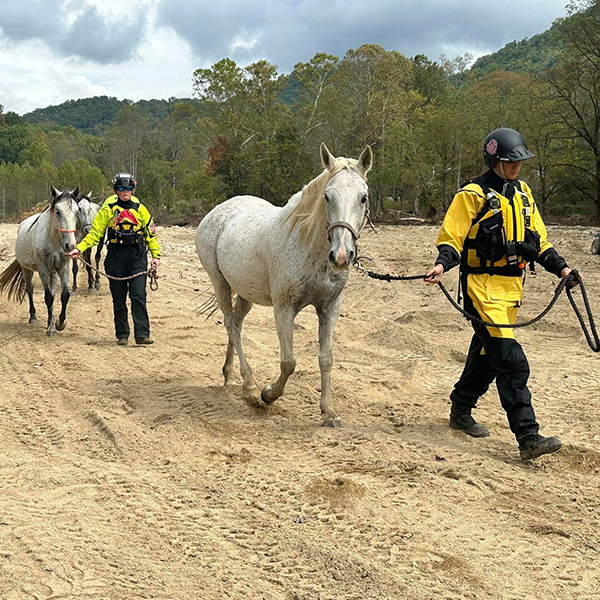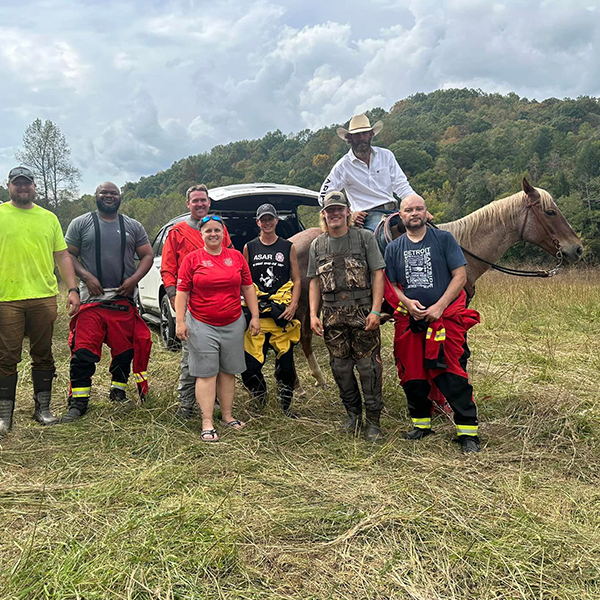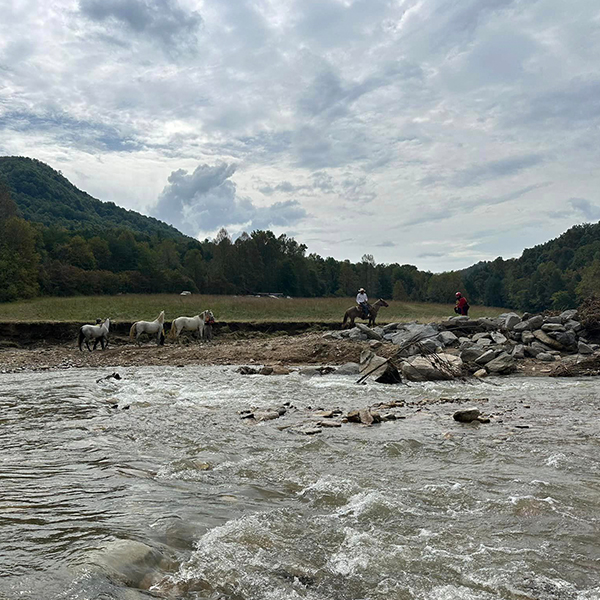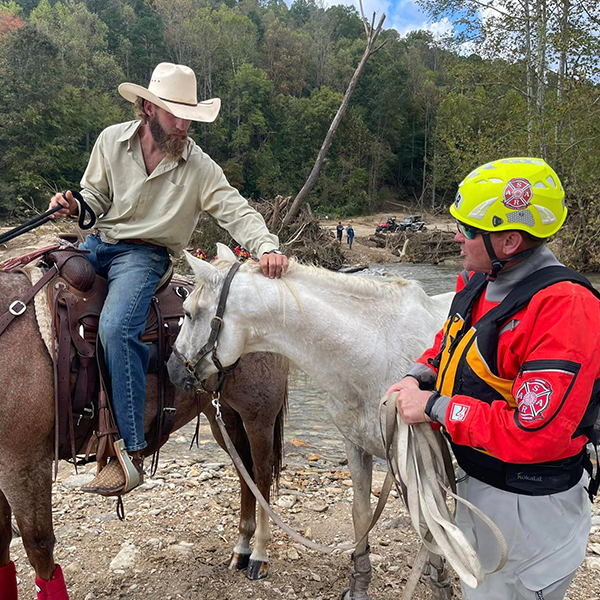The aftermath of natural disasters Hurricane Helene and Hurricane Milton was marked by what has been described as “biblical floods” that claimed the lives of over 220 individuals throughout the southeast. The impact of these hurricanes extends beyond human tragedy, particularly devastating for agriculture livestock and horse owners.
When Hurricane Helene swept through the southeast and hovered over the Appalachian Mountains as a tropical storm, it unleashed a force of destruction that left communities grappling with historic devastation. The aftermath of this natural disaster was marked by what has been described as “biblical floods” that claimed the lives of over 220 individuals throughout the southeast, with nearly 100 individuals still unaccounted for in East Tennessee and Western North Carolina. The severity of the situation was compounded just a week later when Hurricane Milton made landfall in the Big Bend area of Florida, where Helene made landfall a week prior, intensifying the suffering in an already devastated region.
The impact of these hurricanes extends beyond human tragedy; it has been particularly devastating for agriculture livestock and horse owners. With roads washed away and infrastructure obliterated, individuals found themselves isolated and cut off from essential resources. Access to fresh water, hay, grain, and secure fencing for their animals has become increasingly difficult, further exacerbating the crisis. The floodwaters not only caused physical isolation but also led to infections from laceration wounds and trauma among horses and livestock that survived the floods, leaving owners unable to care for their animals.
In the midst of the chaos a glimmer of hope has emerged through the tireless efforts of a mass amount of organizations dedicated to providing assistance. Notable among these are the University of Tennessee College of Veterinary Medicine, Tennessee Department of Agriculture, the North Carolina Department of Agriculture and Consumer Services, Fleets of Angels and East Coast Equine Emergency and Disaster Response team, and ASAR Training and Response, a technical rescue team specializing in both FEMA Resource-Typed and NFPA-based training for practical field and disaster animal rescue applications.

These groups mobilized quickly and efficiently to deliver aid and resources to those most in need. Their commitment to helping both people and animals is a testament to the resilience of community spirit in times of crisis. The University of Tennessee College of Veterinary Medicine (UTCVM) deployed its mobile veterinary clinic, in response to the devastation caused by Hurricane Helene. This deployment was in response to a request from the Tennessee Emergency Management Agency (TEMA).
A dedicated shelter medicine team—including faculty, veterinary technicians, and veterinary students, established a disaster veterinary services clinic. The clinic is providing essential care for pets affected by the hurricane. This was a collaborative effort among UTCVM, UT Emergency Management, TEMA, the Humane Society of the United States, and is being supported by Boehringer Ingelheim.
“Providing veterinary services for sick or injured pets is an important part of the recovery from Hurricane Helene,” said Dr. Becky Debolt, clinical associate professor of shelter medicine at UTCVM. “Pets are an important part of our lives, and we hope our work helps strengthen the human-animal bond in these challenging times.”
The dedication of the ASAR Training and Response and their partners in Western North Carolina has been truly remarkable. Following Helene, the North Carolina Department of Agriculture and Consumer Services Agriculture Emergency Hot-line received an urgent call about 22 horses trapped in Black Mountain, NC. ASAR swiftly mobilized for the mission. Despite battling challenging conditions such as creeks, rivers, and washed-out roads, the specially trained technical rescue operators persevered. They paddle boarded food to the stranded horses while formulating a rescue plan for the herd.

Ultimately, the horses were successfully rescued. Shortly thereafter, ASAR was then mobilized to Florida to assist as Hurricane Milton made landfall, causing flooding and storm surges that trapped farm animals in the coastal region. Eric Thompson, Executive Director of Disaster and Field Response with Animal Incident Management group, and Senior Director with ASAR Training and Response stated, “The ASAR team we put together has several members from organizations that we would like to acknowledge, especially those that are native to the North Carolina area.
While ASAR Training and Response is the national platform that works with state and federal partners during disasters and provides credentialed training to anyone that would like to be an ASAR responder; we often utilize regional specialists in cases like the Black Mountain herd evacuation. Responders that made up that ASAR evacuation team included: ASAR Training and Response, Code 3 Associates, Michigan Humane Society, Rescue Ranch from Statesville, NC, 4Hooves Large Animal Services, from NC, and SM Performance Horses.”
The sense of community support has been palpable, as residents have come together to help one another in the face of adversity. One shining example of this collective effort is Mountain Mule Packer Ranch. This team, along with their pack of mules, was a vital lifeline for those residing in the most inaccessible areas affected by the storms. With roads completely gone, pack mules made trips to deliver essential supplies to individuals who were completely cut off from all aid. Recent improvements in road accessibility have allowed ATVs and other vehicles to transport goods, but as the Mountain Mule Packer team notes on their Facebook page, the mules remain ready to assist wherever they are needed.
As the seasons change, new challenges arise for families already facing the daunting task of recovery. The first snow fell in Western North Carolina on October 15th, signaling an urgent need for continued support as colder weather sets in. The implications of winter weather complicate the recovery process, making it even more critical for affected families to secure the resources they need to care for their animals and themselves.

The equestrian community has stepped up to support those in need. Many have rallied to provide grain, hay, water, shelter, and temporary stabling for evacuated horses and livestock. This collective effort underscores the power of community and the deep connections people have with their animals. The willingness to help one another, especially in times of crisis, highlights the compassion that exists within these communities. Reports indicate that the extensive damage caused by Hurricane Helene will require years to rebuild and restore.
Reflecting on the resilience and strength of the affected communities, federal and local agencies are relying on ongoing donations to help those who have lost everything. The support of community represents a step toward rebuilding lives, restoring hope, and healing wounds left by this tragedy. With hundreds of people and animals that have been swept away from flood waters and storm surge, those who have survived have been uprooted from the livelihood they once knew.
The bond between humans and animals during these trying times cannot be overlooked. For our community, pets and horses are not just animals; they are beloved companions, partners in life, and a source of emotional support. The distress caused by the loss, injury, or displacement of these animals adds another layer of complexity to an already challenging situation. The equestrian community’s response reflects the deep connection, as individuals come together to ensure the welfare of all creatures affected by the storms.
The aftermath of Hurricane Helene and Hurricane Milton serves as a stark reminder of nature’s power and the fragility of our lives. Yet, it is also a testament to the strength of community, compassion, and the unwavering spirit of those who refuse to give up in the face of adversity. As we witness the ongoing recovery efforts, let us stand in solidarity with our neighbors, lend a helping hand, and contribute to rebuilding lives. Together, community can navigate the difficult path ahead and emerge stronger on the other side. Support is invaluable, and every act of kindness counts in making a difference in the lives of those affected. Please visit www.midsouthhorsereview.com/helene_milton to see an ongoing compilations of ways to support, donate and give to those devastated by Hurricane Helene and Milton.








